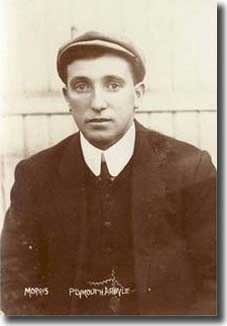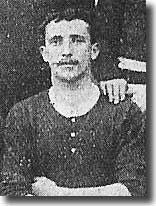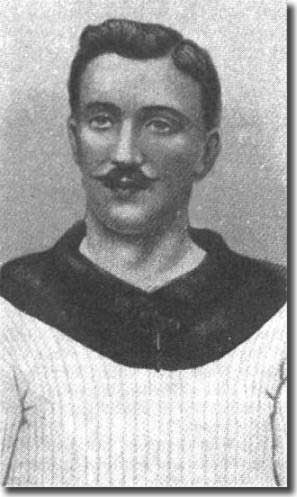 Welsh
inside-forward Dickie Morris was the first Leeds City player to win international
honours while on the Elland Road club's books. Selection for Wales for
the match against Ireland in March 1906 allowed him to add to the eight
caps he already had to his name when signing for the Peacocks a year earlier.
Welsh
inside-forward Dickie Morris was the first Leeds City player to win international
honours while on the Elland Road club's books. Selection for Wales for
the match against Ireland in March 1906 allowed him to add to the eight
caps he already had to his name when signing for the Peacocks a year earlier.
Renowned for his energetic displays and excellent ball control, Morris
was described as a 'tireless runner and top speed dribbler'; he brought
style and class to the City forward line as they sought to build on their
admission to the first class game. As an established international forward,
he was something of a jewel in the Elland Road crown.
Born in Newtown, Montgomeryshire, there is some speculation about exactly
when Morris was born, though it is known to be between 1879 and 1883.
Martin Jarred and Malcolm Macdonald suggest 25 April 1883 in their later
work, though there are a range of other sources that indicate 1 January
1879, and in earlier books Jarred and Macdonald had quoted 1879. The 1901
Census lists a number of men by the name of Richard Morris who were born
in Montgomeryshire in 1879, 1880 and 1883. Circumstantial evidence strongly
suggests that 1879 is the likeliest birth date.
Dickie Morris joined the Army in his teens and saw active service in
the Boer War. When the conflict ended in 1902, he returned to Wales
and signed on for his home town club, RWW Newtown FC. Formed in 1875
as Newtown White Stars, the club is one of the oldest in the principality
and among the founder members of the Football Association of Wales.
They were the victors when the Welsh Cup was staged for the second time
in 1879.
Almost immediately after joining Newtown, Morris was called up to the
Welsh national team and won his first cap. He played on the left wing
in a Red Dragons eleven that lost 3-0 to Ireland at the Arms Park, Cardiff,
on February 22, 1902. Morris did enough to retain his place for the game
against England at Wrexham a couple of weeks later, playing on the opposite
wing to the legendary Billy Meredith, then of Manchester City. A penalty
save by the renowned Welsh keeper Leigh Richmond (Dick) Roose was crucial
in securing a goalless draw.
By the time of the following international, against Scotland at Greenock
on 15 March (when he was switched to inside-forward), Morris had quit
Newtown for Druids of Ruabon (nowadays NEWI Cefn Druids). The Scots
hammered the Welsh by five goals to one in a game staged just three
weeks prior to the Ibrox disaster when 26 people lost their lives and
547 others were injured during the Scotland-England match.
Morris' spell at Druids was extremely brief and by the end of March
he had been recruited by reigning First Division champions Liverpool,
making his senior debut at home to Bury on April 19, 1902.
Over the next three years, the Welshman appeared in 38 league games for
the Anfield side, scoring five times. Two of those goals came in a Merseyside
derby clash with Everton in October 1903. Liverpool were relegated at
the end of that season but regained their First Division spot at the first
attempt in 1905.
During his time at Liverpool, Morris was a regular with Wales, playing
in all their five fixtures between March 9 1903 and March 21 1904. The
pick of those games was the 2-2 draw with England at Wrexham on 29 February
1904.  The
result meant that the Welsh had beaten the English twice and drawn five
times in 26 matches since their first pairing in 1879 and Morris had featured
in two of the draws. Such results represented a vast improvement on recent
heavy defeats, 6-0 in 1893, 5-1 1894, 9-1 1896, 4-0 1897, 3-0 1898, 4-1
1899 and 6-0 1901. Morris had every right to be proud of the part he played
in his country's upturn in fortunes.
The
result meant that the Welsh had beaten the English twice and drawn five
times in 26 matches since their first pairing in 1879 and Morris had featured
in two of the draws. Such results represented a vast improvement on recent
heavy defeats, 6-0 in 1893, 5-1 1894, 9-1 1896, 4-0 1897, 3-0 1898, 4-1
1899 and 6-0 1901. Morris had every right to be proud of the part he played
in his country's upturn in fortunes.
back to top
In pursuit of regular first team football, Morris quit Liverpool in 1905
to sign for Leeds City as they prepared
for life as a Football League club. The Yorkshire Post hailed
his capture as a major coup, describing Morris as a 'clever exponent of
the forward game'.
Morris quickly established himself as a favourite with the Elland Road
fans after playing at inside-left in the club's first
Second Division game on September 2 1905. The Mercury noted that he
'was much in evidence, and his trickiness and deft passing to Singleton,
his partner on the left wing, pleased the crowd'.
His first City goal came in the 3-1 defeat of local rivals Hull City
on 23 September, and he added a second score to settle the issue. The
Yorkshire Post: 'Singleton and Morris were a capital left wing
pair ... It was the old Welsh international's judgement which enabled
him, when Hargraves could not get up to take a centre brilliantly made
by Parnell, to rush up from the other wing and,
with a fast oblique shot, give the home team their first goal.'
Two weeks later, Morris scored four goals, a feat matched by centre-forward
Fred Hargraves, as City hammered Morley
11-0 in an FA Cup preliminary round game.
He also showed up well in the next round when City beat Mexborough
3-1, netting the decisive second goal with a magnificent header.
Morris was an ever-present until 9 December, but lost his place in February,
playing in just four of the Peacocks' final 15 games. This was partly
due to a serious injury received in a 1-1 draw at Grimsby on 17 March
when the home side kicked the visitors out of the game. The Leeds Mercury
reported that  Morris
'had practically to be lifted out' of the train when it arrived back in
Leeds.
Morris
'had practically to be lifted out' of the train when it arrived back in
Leeds.
Two weeks earlier Morris had returned to the Welsh side to earn his
ninth cap, thus becoming the first City player to appear in an international.
Martin Jarred: 'Morris' lone Wales appearance while a City player produced
one of the principality's finest results to date. The previous season,
inspired by the great wing wizard Billy Meredith, they had beaten Scotland
for the first time after 30 years of trying. But few gave the Welsh any
hope of repeating the feat when they tackled the Scots at Tynecastle 12
months later, because Manchester City star Meredith was serving a suspension
for allegedly bribing an Aston Villa player to lose a match.
'The Welsh selectors were also without several other regulars but the
stand-ins, some drawn from league clubs' reserve sides, did their country
proud. Meredith's replacement, Lot Jones, opened the scoring when goalkeeper
Jimmy Raeside allowed a shot to slip through his hands. Another Jones,
Stoke reserve John, who had come in for Notts County's Arthur Green, added
another to give Wales a 2-0 win and surprise back to back victories against
the Scots.'
After a promising season with Leeds City, it was something of a surprise
when Morris decided to depart Elland Road at the end of the campaign.
In fairness, though, his entire career consisted entirely of a series
of short stays.
He scored five times in 25 league games for City, adding another five
in 6 FA Cup appearances. In June 1906 he threw in his lot with the same
Grimsby Town whose players had so adeptly kicked him out of the game in
March.
He made a decent contribution in his time with the Mariners, scoring
seven times in 24 Second Division games. It was enough to earn him a
recall to the Welsh team in February 1907. He scored his only goal for
his country in a 3-2 victory over Ireland that helped Wales on the way
to securing their first Home International title.
Morris moved clubs again in the summer of 1907, this time to Southern
League Plymouth Argyle. He became Argyle's first international when
he played his final game for Wales on April 11 1908 in a 1-0 defeat
to Ireland at Aberdare.
At the end of the 1907/08 season Morris signed for Reading, leaving
shortly afterwards for Huddersfield Town. He ended his career with the
West Riding club, retiring at the end of the 1908/09 campaign.
Driven by his restless, nomadic nature, Morris failed to settle at any
of his seven clubs, but he made an impressive and valuable, if short lived,
contribution to Leeds City's early days.
back to top











 Welsh
inside-forward Dickie Morris was the first Leeds City player to win international
honours while on the Elland Road club's books. Selection for Wales for
the match against Ireland in March 1906 allowed him to add to the eight
caps he already had to his name when signing for the Peacocks a year earlier.
Welsh
inside-forward Dickie Morris was the first Leeds City player to win international
honours while on the Elland Road club's books. Selection for Wales for
the match against Ireland in March 1906 allowed him to add to the eight
caps he already had to his name when signing for the Peacocks a year earlier. The
result meant that the Welsh had beaten the English twice and drawn five
times in 26 matches since their first pairing in 1879 and Morris had featured
in two of the draws. Such results represented a vast improvement on recent
heavy defeats, 6-0 in 1893, 5-1 1894, 9-1 1896, 4-0 1897, 3-0 1898, 4-1
1899 and 6-0 1901. Morris had every right to be proud of the part he played
in his country's upturn in fortunes.
The
result meant that the Welsh had beaten the English twice and drawn five
times in 26 matches since their first pairing in 1879 and Morris had featured
in two of the draws. Such results represented a vast improvement on recent
heavy defeats, 6-0 in 1893, 5-1 1894, 9-1 1896, 4-0 1897, 3-0 1898, 4-1
1899 and 6-0 1901. Morris had every right to be proud of the part he played
in his country's upturn in fortunes. Morris
'had practically to be lifted out' of the train when it arrived back in
Leeds.
Morris
'had practically to be lifted out' of the train when it arrived back in
Leeds.